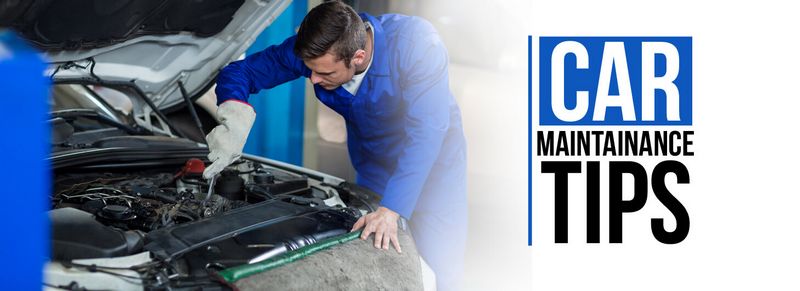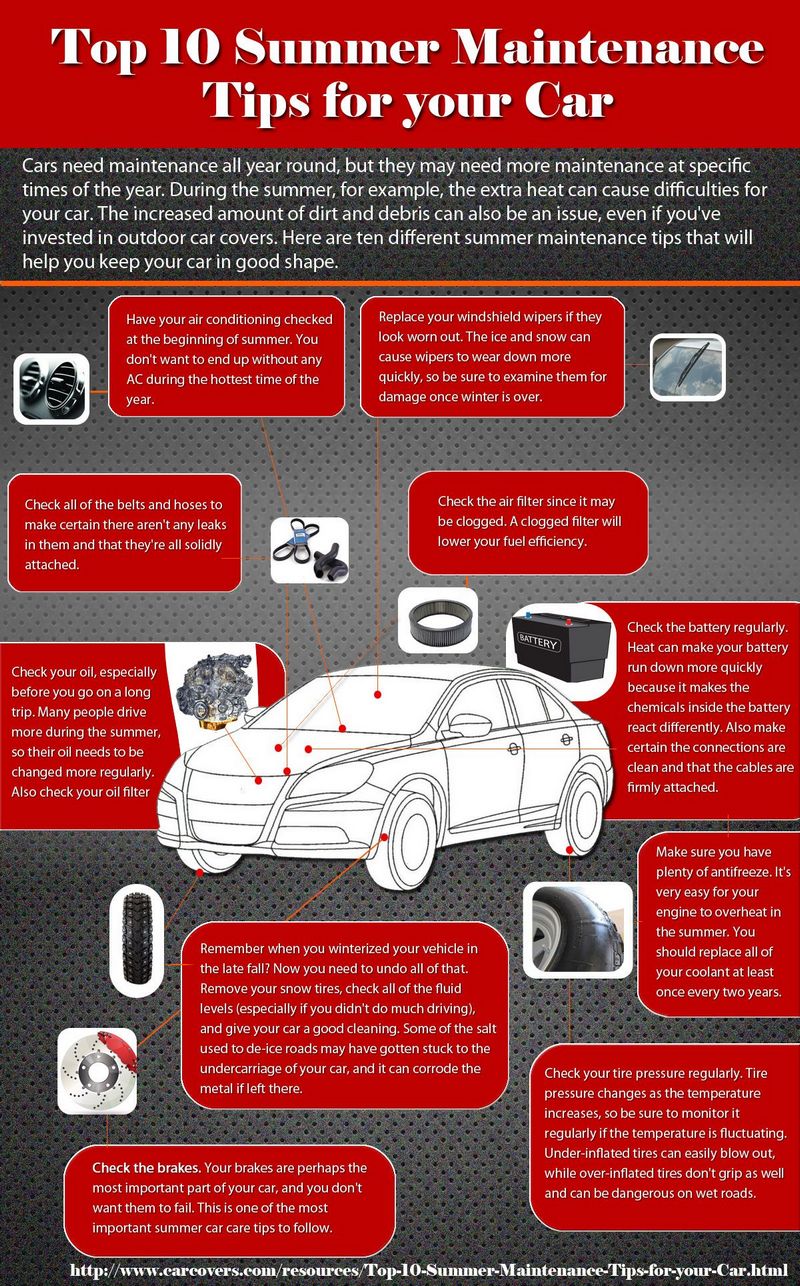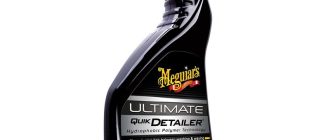
Car Care 101: Tips to Maintain Your Vehicle for Years
When it comes to taking care of your car, it’s important to prioritize long-term maintenance. By implementing a few simple tips, you can ensure that your vehicle stays in top condition for years to come.
TIP 1: Regular Maintenance
Regularly servicing your car is crucial for its longevity. Schedule routine check-ups and oil changes to keep your engine running smoothly. Don’t forget to change your filters and spark plugs as needed.
TIP 2: Keep it Clean
Maintaining a clean car not only enhances its aesthetic appeal but also prevents rust and decay. Wash your car regularly and apply a protective wax coating to keep it looking brand new.
TIP 3: Check Your Tires
Your car’s tires are the only point of contact with the road, so it’s important to keep them in good condition. Check the tire pressure regularly and rotate them as recommended. Don’t forget to replace them when the tread wears out.
TIP 4: Mind the Fluids
Keep an eye on your car’s fluids, including the coolant, transmission fluid, brake fluid, and power steering fluid. Regularly check their levels and top up or replace them as necessary.
TIP 5: Protect Your Interior
Invest in car seat covers, floor mats, and sunshades to protect your vehicle’s interior from wear and tear. Regularly clean and condition the upholstery to maintain its appearance.
Remember, proper car care is not just about maintaining appearances – it’s about keeping your vehicle in the best possible condition for years to come.
By following these essential tips, you can ensure that your car remains a reliable and well-maintained vehicle for the long haul.
Regular Maintenance
Proper vehicle maintenance is crucial to ensure that your car stays in optimal condition for years to come. By following these essential tips, you can keep your car running smoothly and avoid costly repairs in the long run.
- Change the oil regularly: Regular oil changes are essential to keep your engine running smoothly. Follow your manufacturer’s recommendations for the appropriate oil change interval for your vehicle.
- Check and replace filters: Regularly inspect and replace your air, fuel, and oil filters to ensure that your engine receives clean air and fuel, and that the oil remains free of contaminants.
- Monitor tire pressure: Keeping your tires properly inflated is crucial for both safety and fuel efficiency. Check your tire pressure regularly and inflate them to the recommended levels.
- Rotate and balance tires: To ensure even tread wear and extend the life of your tires, have them rotated and balanced regularly.
- Inspect and replace wiper blades: Worn-out wiper blades can reduce visibility during rainy or snowy conditions. Inspect and replace them as needed to maintain clear windshield visibility.
- Check and replace brake pads: Regularly inspect your brake pads and replace them when they are worn out. This will ensure optimal braking performance and safety.
By following these regular maintenance tips, you can extend the lifespan of your vehicle and save money on costly repairs down the road. Remember, taking care of your car is essential for its long-term reliability and performance.
Oil Changes
Regular oil changes are essential for the long-term maintenance of your vehicle. Here are some tips to help you maintain your car’s engine for years to come:
- Follow the recommended schedule: Consult your car’s manual or speak to a mechanic to determine how often you should change your oil. Typically, it is recommended to change the oil every 5,000 to 7,500 miles or every six months.
- Use the right oil: Make sure to use the oil recommended by your car’s manufacturer. This will ensure optimal performance and longevity of your engine.
- Check the oil level regularly: It’s important to check the oil level between oil changes. Low oil levels can cause engine damage. If the oil level is low, top it up as necessary.
- Replace the oil filter: When changing the oil, make sure to also replace the oil filter. This will help keep your engine clean and prevent debris from causing damage.
- Consider synthetic oil: Synthetic oil can offer better protection and performance compared to conventional oil. If your car is compatible, consider using synthetic oil for your oil changes.
By following these tips and maintaining regular oil changes, you can ensure that your vehicle’s engine stays in top condition for years to come. Remember, proper car care is 101 when it comes to maintaining your vehicle’s longevity!
Tire Rotation
Tire rotation is an essential part of car maintenance that can help extend the life of your tires and improve your vehicle’s performance. By regularly rotating your tires, you can ensure even wear and maximize their lifespan.
Here are some tips for tire rotation:
- Frequency: It is recommended to rotate your tires every 6,000 to 8,000 miles or every six months, whichever comes first. This can vary depending on your driving habits and the type of tires you have.
- Pattern: There are different tire rotation patterns, including the Forward Cross, X-Pattern, and Rearward Cross. It is important to follow the manufacturer’s recommendations or consult a professional for the appropriate pattern for your car.
- Check Tire Pressure: Before rotating your tires, check their pressure and adjust it as needed. Proper tire pressure ensures optimal performance and safety on the road.
- Inspect Tires: Take the opportunity to inspect your tires for any signs of damage or uneven wear during the rotation process. If you notice any issues, it may be necessary to replace the tires.
- Consult a Professional: If you are unsure about how to properly rotate your tires or do not have the necessary tools, it is recommended to consult a professional. They can ensure the job is done correctly and help maintain your car’s warranty.
By following these tire rotation tips, you can help maintain your car’s tires for years to come. Regular rotation can improve fuel efficiency, handling, and overall safety on the road. Remember, car care 101 starts with taking care of your tires!
Air Filter Replacement
Maintaining your vehicle’s air filter is an essential part of car care 101. The air filter plays a crucial role in keeping your engine running smoothly and efficiently.
Here are some tips to help you with air filter replacement:
- Frequency: Replace your air filter every 12,000 to 15,000 miles or as indicated by your vehicle’s manufacturer. Regularly replacing your air filter helps to maintain optimal engine performance.
- Check and Inspect: Regularly inspect your air filter for any signs of damage or clogging. A dirty or clogged air filter can reduce fuel efficiency and negatively impact engine performance.
- Quality Replacement: When replacing your air filter, choose a high-quality replacement filter that meets or exceeds your vehicle’s specifications. This ensures proper filtration and optimal engine performance.
- DIY or Professional: Air filter replacement can be a DIY task if you’re comfortable working on your vehicle. However, if you’re unsure or don’t have the necessary tools, it’s best to consult a professional.
Benefits of Regular Air Filter Replacement:
- Improved Fuel Efficiency: A clean air filter allows for proper air flow, optimizing fuel combustion and helping to improve gas mileage.
- Extended Engine Life: A clean air filter prevents dust, dirt, and debris from entering the engine, reducing wear and tear on vital engine components.
- Enhanced Engine Performance: A properly functioning air filter ensures that the engine receives clean air, improving acceleration and overall performance.
- Reduced Emissions: A clean air filter helps to reduce harmful emissions, contributing to a cleaner environment.
By following these tips and regularly replacing your air filter, you can maintain your vehicle’s performance, improve fuel efficiency, and prolong the life of your engine.
Fluid Checks
Regular fluid checks are essential to maintain the proper functioning of your vehicle for years to come. Here are some tips to help you take care of your car:
- Engine Oil: Check the engine oil level regularly and change it according to the manufacturer’s recommendations. Clean and sufficient oil is crucial for the longevity of your engine.
- Coolant: It is important to check the coolant level and ensure that it is topped up to the recommended level. The coolant helps regulate the engine temperature and prevents overheating.
- Brake Fluid: Regularly inspect the brake fluid level and make sure it is within the recommended range. Proper brake fluid levels ensure optimal brake performance and safety.
- Power Steering Fluid: Check the power steering fluid regularly to ensure smooth steering operation. Inadequate fluid levels can cause difficulty in steering and affect the overall driving experience.
- Transmission Fluid: Regularly check the transmission fluid level and condition. Low or dirty transmission fluid can lead to transmission problems and costly repairs.
- Windshield Washer Fluid: Make sure the windshield washer fluid is filled to the appropriate level. It is crucial for clear visibility and safe driving, especially during inclement weather.
By regularly checking and maintaining these fluids, you can extend the lifespan of your car and enjoy a smooth and trouble-free driving experience for many years to come.
Coolant
Proper coolant maintenance is essential for the long-term health of your car. Let’s take a look at some tips to help you maintain your vehicle’s coolant system and keep it running smoothly for years to come.
- Check the coolant level regularly. It’s important to keep the coolant at the proper level to prevent overheating and damage to your engine.
- Inspect the coolant for any signs of contamination or discoloration. If you notice any abnormalities, it may be necessary to flush and replace the coolant.
- Ensure that the coolant mixture is correct. Using the right ratio of coolant to water is crucial for efficient cooling and protection against freezing and boiling.
- Replace the coolant according to the manufacturer’s recommendations, typically every 2 to 5 years. Over time, coolant can break down and lose its effectiveness.
- Regularly inspect the coolant hoses and connections for any leaks or damage. Replace any worn-out or damaged components to prevent coolant leaks.
- Consider using a coolant additive or conditioner to enhance the performance and longevity of your coolant system. These products can help prevent corrosion and improve heat transfer.
Proper coolant maintenance will not only help your car stay cool, but it can also prevent costly engine repairs down the line. Take the time to follow these tips, and your car will thank you with years of reliable performance!
Brake Fluid
When it comes to vehicle maintenance, one of the most important aspects to consider is the brake fluid. Proper care and maintenance of your car’s brake fluid can not only ensure your safety on the road, but also prevent costly repairs down the line. Here are some essential tips to keep your brake fluid in tip-top shape:
- Regular Checks: It’s important to regularly check the level and condition of your brake fluid. Low fluid levels or dirty fluid can negatively impact the performance of your brakes.
- Fluid Replacement: Brake fluid should be replaced according to your vehicle manufacturer’s recommended schedule. Over time, brake fluid can absorb moisture, leading to reduced brake performance.
- Brake Fluid Types: There are different types of brake fluid, including DOT 3, DOT 4, and DOT 5.1. Always use the recommended brake fluid type for your car to ensure optimal performance.
- Professional Inspection: It’s a good idea to have your brake fluid system inspected by a professional mechanic to catch any potential issues early on.
Overall, maintaining and caring for your car’s brake fluid is an essential part of vehicle maintenance 101. By following these tips, you can ensure your brakes operate smoothly and safely, giving you peace of mind on the road.
Transmission Fluid
When it comes to vehicle care 101, one of the most essential components to maintain is the transmission fluid. The transmission fluid plays a crucial role in ensuring your car’s transmission operates smoothly and efficiently.
What is transmission fluid?
Transmission fluid is a lubricant that helps cool and protect the moving parts inside your car’s transmission system. It helps to minimize friction and heat, which can lead to premature wear and damage.
Why is it important to maintain transmission fluid?
Regularly checking and changing the transmission fluid is crucial in ensuring the longevity and performance of your vehicle’s transmission system. Here’s why:
- Prevents overheating: Transmission fluid helps to dissipate heat and prevent the transmission from overheating, which can cause severe damage.
- Optimizes shifting: Clean and fresh transmission fluid is essential for smooth gear shifting. Old or dirty fluid can cause rough shifting and potential transmission problems.
- Extends lifespan: By maintaining the correct levels and quality of transmission fluid, you can significantly extend the lifespan of your vehicle’s transmission system. This can save you from expensive repairs or replacements in the future.
When should you check and change transmission fluid?
It is recommended to check your vehicle’s transmission fluid at least once a year or every 30,000 miles, whichever comes first. However, it’s always best to consult your car’s owner manual for specific recommendations for your make and model.
If you notice any signs of transmission fluid problems, such as a burning smell, unusual noises, or difficulty shifting gears, it is essential to have the fluid checked and changed immediately.
Conclusion

Transmission fluid is a vital component in maintaining a healthy and long-lasting transmission system for your vehicle. By regularly checking and changing the fluid, you can ensure smooth gear shifts, prevent overheating, and extend the lifespan of your car’s transmission for years to come.
Battery Care
One of the most important components of a car’s electrical system is the battery. Proper battery care is essential to maintain its longevity and ensure a reliable start for years to come.
- Regular Inspections: Regularly inspect your car’s battery for any signs of damage or corrosion. Check for loose connections and clean any buildup using a mixture of baking soda and water.
- Charge Maintenance: Keep your battery charged to prevent it from losing its capacity. If you’re not using your vehicle for an extended period, consider using a battery maintainer or trickle charger to maintain the charge.
- Temperature Considerations: Extreme temperatures can affect the performance of your car battery. In hot climates, keep the battery cool by parking in shaded areas or using a battery insulator. In cold climates, consider using a battery blanket or heater to prevent the battery from freezing.
- Driving Habits: Avoid frequent short trips that don’t allow the battery to fully charge. Take longer drives occasionally to ensure the battery gets a full charge.
- Professional Maintenance: If you’re unsure about the condition of your battery or if it’s nearing the end of its lifespan, consider getting it tested by a professional. They can check the voltage, cold cranking amps, and overall health of the battery.
By following these battery care tips, you can prolong the life of your car’s battery and ensure its optimal performance for years to come.
Engine Performance
It’s important to maintain your car’s engine for optimal performance and extend the life of your vehicle for many years to come. Here are some essential tips for taking care of your car’s engine:
- Regular oil changes: Regularly changing the engine oil and filters will help keep your engine running smoothly and prevent any build-up of dirt and debris.
- Check fluid levels: Make sure to check the coolant, brake fluid, and transmission fluid regularly to ensure they are at the proper levels.
- Inspect belts and hoses: Check the belts and hoses for any signs of wear or damage, such as cracks or leaks. Replace them if necessary to avoid any potential engine failures.
- Keep the engine clean: Clean the engine regularly to remove any dirt, grime, or debris that can accumulate over time. This will help maintain optimal engine performance and prevent overheating.
- Use high-quality fuel: Using high-quality fuel can improve engine performance and fuel efficiency. Avoid using low-quality or contaminated fuel, as it can cause damage to the engine.
- Address warning signs: Pay attention to any warning signs such as strange noises, engine misfires, or decreased performance. Address these issues promptly to prevent further damage to the engine.
By following these tips, you can ensure that your car’s engine performs at its best and lasts for many years to come.
Maintaining the Exterior
Maintaining the exterior of your vehicle is crucial for keeping it looking great and protecting it from the elements. Here are some essential tips to help you maintain your car’s exterior for years to come:
- Wash your car regularly: Regularly washing your car helps remove dirt, dust, and other contaminants that can damage the paint and finish. Use a mild car wash soap and a microfiber cloth or sponge to protect the paint.
- Wax your car for added protection: Applying wax to your car’s exterior provides an extra layer of protection against UV rays, dirt, and other environmental factors. Waxing also gives your car a shiny, polished look.
- Keep your car covered: If possible, park your car in a covered area or use a car cover to protect it from harsh weather conditions and harmful UV rays. This will help prevent fading, paint damage, and keep the car cooler on hot days.
- Inspect and repair paint chips and scratches: Regularly inspect your car’s exterior for any paint chips or scratches. Repairing them promptly will prevent rust and further damage to the paintwork.
- Clean your car’s windows and mirrors: Use a good quality glass cleaner to clean your car’s windows and mirrors. Regular cleaning will improve visibility and make your car look cleaner.
- Protect your car from bird droppings and tree sap: Bird droppings and tree sap can be damaging to your car’s paint. Promptly remove them using a gentle car cleaner and a soft cloth to avoid stains or paint damage.
- Take care of your car’s tires: Regularly check the tire pressure and inflate them to the recommended levels. Keep your tires clean and apply tire dressing to protect them from cracking or drying out.
By following these tips, you can maintain the exterior of your vehicle and ensure that it looks great for years to come. Remember, proper care and maintenance will not only enhance the appearance of your car but also protect its value.
Washing and Waxing
One of the most important aspects of maintaining your vehicle’s appearance and protecting its paint is regular washing and waxing. By taking care of the exterior of your car, you can ensure that it looks great for many years to come.
Here are some essential tips for washing and waxing your car:
- Choose the right products: Use a high-quality car wash soap and a soft sponge or microfiber cloth to wash your car. Avoid using harsh detergents or abrasive materials that can damage the paint.
- Start with a rinse: Before washing your car, give it a thorough rinse to remove any loose dirt or debris. This will help prevent scratching the paint during the washing process.
- Wash from top to bottom: Always start washing your car from the top and work your way down. This will prevent dirty water from running down on already clean areas.
- Use separate buckets: Fill one bucket with clean, soapy water for washing and another with plain water for rinsing your sponge or cloth. This will help keep your wash water clean and prevent dirt from being transferred back to your car.
- Dry with a chamois or microfiber towel: After washing, use a chamois or microfiber towel to dry your car. This will help prevent water spots and streaks.
- Apply wax for protection: Once your car is clean and dry, apply a coat of wax to protect the paint. Waxing helps to seal and maintain the shine, as well as provide a layer of protection against UV rays and contaminants.
- Consider a sealant or ceramic coating: For even more long-lasting protection, you may want to consider applying a sealant or ceramic coating to your car’s paint. These products provide enhanced durability and resistance to scratches and environmental elements.
By following these washing and waxing tips, you can maintain the appearance and protect the paint of your vehicle for years to come. Remember, regular care and attention will go a long way in keeping your car looking its best!
Paint Protection
Protect your vehicle’s paint job for years to come
As a car owner, it’s important to take care of your vehicle’s paint to maintain its appearance and value. With our paint protection services, you can keep your car looking new for years.
- Prevent chips and scratches
- Preserve the shine
- Easy maintenance
- Long-term investment
Our paint protection products create a barrier that shields your vehicle from road debris, rocks, and other objects that can cause unsightly chips and scratches. By investing in paint protection, you can avoid costly touch-up jobs.
Our paint protection products also help to preserve the shine of your vehicle’s paint. UV rays, dirt, and pollutants can cause fading and dullness over time, but with our protection, your car will stay looking as vibrant and glossy as the day it was painted.
With paint protection, maintaining the appearance of your vehicle becomes much easier. The protective coating repels dirt, making it easier to clean your car and reducing the need for frequent washing.
Investing in paint protection is a wise decision for the long-term. Not only does it keep your vehicle looking great, but it also helps to maintain its value. A well-maintained car with a flawless paint job can fetch a higher resale price when it’s time to upgrade.
Take care of your car’s paint job and enjoy a vehicle that looks amazing for years. Contact us today to learn more about our paint protection services and schedule an appointment.
Interior Care
When it comes to maintaining your car, it’s important not to forget about the interior. Proper care of your vehicle’s interior will help it stay comfortable and clean for years to come. Here are some essential tips to keep in mind:
- Clean and vacuum regularly: Regularly cleaning and vacuuming your car’s interior will help prevent dirt, dust, and debris from building up. Use a soft cloth and gentle cleaning solution to wipe down surfaces, and a vacuum with a small brush attachment to get into tight spaces.
- Protect your seats: Invest in seat covers or use protective sprays to keep your seats looking like new. This will help prevent stains and damage from spills, pets, and everyday wear-and-tear.
- Use floor mats: Floor mats are a must-have for any car interior. They protect your floors from dirt, mud, and other debris, and are easy to clean or replace when necessary.
- Avoid eating in your car: Eating in your car can cause crumbs and spills, which can attract pests and cause unpleasant odors. Try to avoid eating in your car as much as possible, and if you do, be sure to clean up any messes immediately.
- Keep it organized: Use organizers, storage bins, and other accessories to keep your car’s interior clutter-free. This will not only make your car look better, but also make it easier to find what you need when you’re on the go.
By following these interior care tips, you’ll be able to maintain the cleanliness and comfort of your car for years to come. Remember, a well-maintained interior is just as important as a well-maintained exterior!
Upholstery Cleaning
When it comes to car care, upholstery cleaning is an essential part of maintaining the quality of your vehicle. Over the years, the upholstery of your car can accumulate dirt, stains, and odors, making it look worn out and unappealing.
Here are some tips to help you maintain your car’s upholstery:
- Clean Regularly: Make sure to clean your car’s upholstery on a regular basis to prevent dirt and stains from setting in. Use a vacuum cleaner or a soft brush to remove any loose dirt or debris.
- Treat Stains: If you notice any stains on your upholstery, treat them immediately to prevent them from becoming permanent. There are various upholstery cleaners available in the market that can effectively remove different types of stains. Follow the instructions on the cleaner and use a clean cloth to gently blot the stain.
- Protect from Sunlight: Sunlight can cause the color of your upholstery to fade over time. Invest in a car sunshade or park your car in a shaded area to protect your upholstery from direct sunlight.
- Use Seat Covers: Consider using seat covers to protect your upholstery from spills, dirt, and wear and tear. Seat covers are easy to clean and can help prolong the life of your upholstery.
By following these simple tips, you can maintain the cleanliness and appearance of your car’s upholstery for years to come. Remember, regular care and maintenance are crucial for preserving the value of your car and ensuring your comfort while driving.
| Regular cleaning | Prevents dirt and stains from setting in |
| Treating stains immediately | Prevents permanent stains |
| Protecting from sunlight | Prevents color fading |
| Using seat covers | Protects from spills, dirt, and wear and tear |
Don’t neglect the care of your car’s upholstery. Start implementing these tips today and enjoy a clean and comfortable ride for years to come.
Questions and answers:
What is “Car Care 101: Essential Tips for Long-Term Vehicle Maintenance” about?
“Car Care 101: Essential Tips for Long-Term Vehicle Maintenance” is a comprehensive guide that provides tips and advice for maintaining vehicles over the long term. It covers everything from regular maintenance tasks to troubleshooting common issues.
Who is the target audience for “Car Care 101: Essential Tips for Long-Term Vehicle Maintenance”?
The target audience for “Car Care 101: Essential Tips for Long-Term Vehicle Maintenance” is anyone who owns a vehicle and wants to learn how to properly care for it. It is suitable for both new and experienced car owners.
What topics are covered in “Car Care 101: Essential Tips for Long-Term Vehicle Maintenance”?
“Car Care 101: Essential Tips for Long-Term Vehicle Maintenance” covers a wide range of topics, including regular maintenance tasks such as oil changes and tire rotations, as well as more advanced topics like troubleshooting engine problems and maintaining the car’s electrical system.
Why is “Car Care 101: Essential Tips for Long-Term Vehicle Maintenance” important?
“Car Care 101: Essential Tips for Long-Term Vehicle Maintenance” is important because proper vehicle maintenance can help extend the lifespan of the car and prevent costly repairs. It also ensures that the vehicle is safe and reliable to drive.





